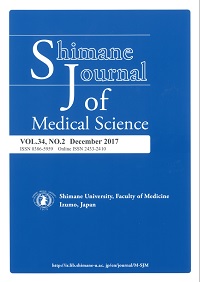Shimane University Faculty of Medicine
ISSN :0386-5959(冊子体)
ISSN :2433-2410(オンライン)


これらの論文は クリエイティブ・コモンズ 表示 - 非営利 - 改変禁止 4.0 国際 ライセンスの下に提供されています。
ダウンロード数 : ? 件
この文献の参照には次のURLをご利用ください : https://ir.lib.shimane-u.ac.jp/34665
Shimane Journal of Medical Science 16 1
1998-06-01 発行
Expansive negative T waves without myocardial damage may be a premonitory sign of transient cerebral ischemia
矢野 修一
宍戸 真司
ファイル
内容記述(抄録等)
Expansive negative T waves were observed in a patient with chronic respiratory failure. The electrocardiogram (ECG) revealed expansive negative T waves in leads I, II, aVL, and V_<3-6>, and the ECG changes persisted for three months. Cardiac enzymes did not rise throughout the course, although these ECG findings suggested acute myocardial ischemia. Seven days after the onset of the ECG changes, a transient ischemic attack occurred in the vertebrobasilar territory. Although a relationship between these ECG changes and cerebral ischemia is unknown, such ECG changes in the absence of myocardial damage might be caused by ischemia of the vertebrobasilar territory, especially the hypothalamus, and might occur as a premonitory sign of transient ischemic attacks.
About This Article
Other Article
PP. 15 - 18
